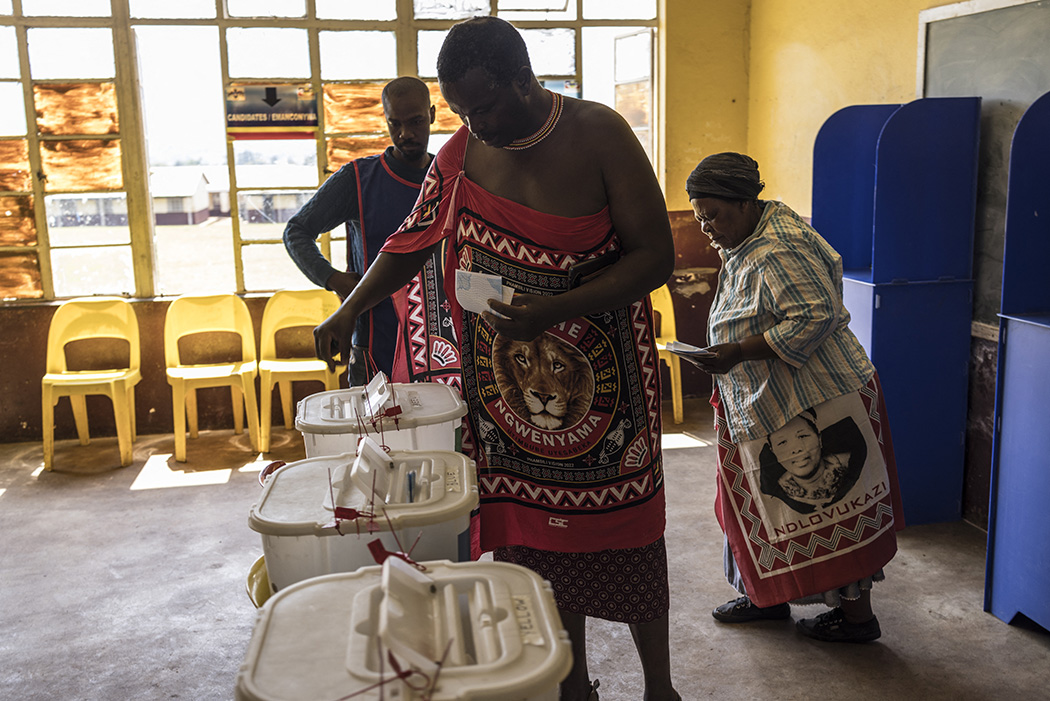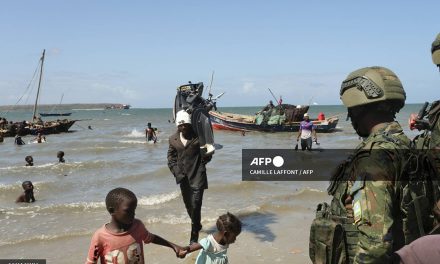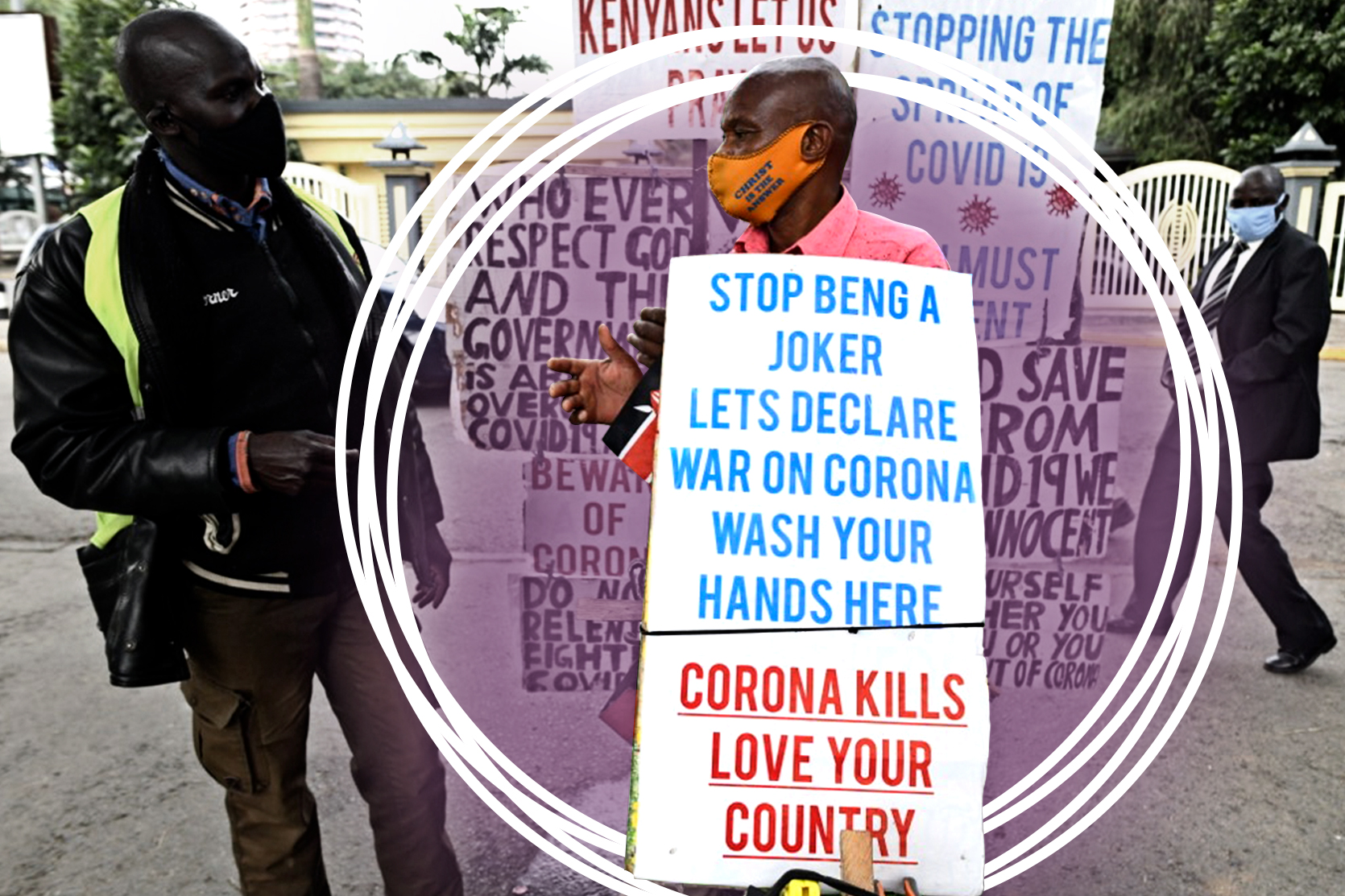The Kingdom of Eswatini held its 2023 General Elections on 29 September. As the kingdom is an absolute monarchy under the rule of King Mswati III, elections do not considerably change the political landscape. Eswatini is the last absolute monarchy in Africa, where Mswati wields absolute power, political parties are banned, and lawmakers contradicting the king are side-lined. Since the elections occurred without any major electoral discrepancies, is it fair to claim it a successful election reflecting the true aspirations of the electorate? Or whether this election is merely a political exercise for King Mswati III to exhibit some façade of providing the citizens with limited democratic rights?

A voter wearing the traditional emahiya attire casts his ballot next to a woman wearing a traditional lihiya attire printed with the portrait of Queen Ndlovukazi, mother of King Mswati III, during Eswatini’s parliamentary elections at a voting station at the National High School in Lobamba, on September 29, 2023. Photo by MARCO LONGARI/AFP
Members (MPs) elected to the House of Assembly were elected from Tinkhundla, which also serves as a host of constituencies for the purposes of electing MPs. The election produced 59 Tinkundla (constituency) ballots for seats in the House of Assembly, including 10 lawmakers King Mswati III appointed directly. In addition, he also selects 20 of the 30 senators in the Senate. The House of Assembly elects the rest. King Mswati III has the prerogative to veto any legislation and appoint the Prime Minister and Cabinet. Thus, any candidate wanting to achieve their political aspirations and political longevity depends on being in the good graces of the King, effectively creating a trust deficit between the King, the government and the citizens.
According to their preliminary statements, the Southern African Development Community Electoral Observation Mission (SEOM) and the African Union Electoral Observer Mission (AUEOM) engaged with a wide range of stakeholders to gauge their readiness to participate in the election process. Among the usual stakeholders met were the Electoral and Boundaries Commission (EBC), government officials, the police, civil society organisations (CSOs), religious leaders and the Diplomatic Corps. Additionally, and importantly, they also engaged with a key stakeholder grouping, “political party representatives”, in a country where political parties are banned. Candidates cannot be affiliated to any political group, rather under the Constitution it emphasises “individual merit” as the basis for selecting MPs and public officials.
Following the 2018 elections, SEOM made several recommendations aimed at strengthening amendments to the legislation governing elections in Eswatini. These recommendations were taken onboard, and relevant legislation was passed:
- The amendment of the Voter Registration Act 4/2013 and Elections Act 6/2013 were passed before the dissolution of Parliament. The Amendments are aimed at promoting transparency, integrity, and credibility of the elections.
- The Voter’s Registration Amendment Act 9/2023 provides for continuous voter registration to be done annually for better voter registration accuracy, uniformity of registration and importantly, placing the burden of proof on the person objecting to the inclusion of the voter in the voter’s register.
- The Elections Amendment Act 8/2023 provides for counting ballots at polling stations instead of counting at a central place for better transparency and safety of the voter, as well as strengthening electoral offences to ensure the implementation of sanctions.
All observer teams present on election day agreed the voting process was generally peaceful and free of irregularities. Most of the polling stations opened on time, or at least within an hour of the scheduled opening time. Polling staff were knowledgeable of the opening procedures and guidelines. Polling stations were capably operated to ensure the smooth processing of voters. Observers also reported all polling stations visited were peaceful with the presence of police officers who were professional in their conduct. Importantly, observers and party agents were present and were able to perform their duties without any restrictions, which contributed to the transparency of the process.
International Electoral Observer recommendations to improve the electoral process
While the election period was generally characterised as calm and peaceful, both SEOM and the AUEOM proposed several recommendations to improve Eswatini’s electoral process, namely:
Political Organisations and Political Parties – a call to conduct peaceful and inclusive dialogue with respect to the organisation of the political system, in particular, the recognition of the role of political parties in the context of the Tinkhundla system. The dialogue should give full effect to Section 25 of the Constitution and Section 236 thereof, which also subscribes to the SADC values and norms as enshrined in the Principles and Guidelines Governing Democratic Elections which provides for the right to freedom of association.
Civil Society Organisations – the Constitution does not explicitly prohibit the formation of political parties, but no law exists providing for the registration of political parties. Observers noted the legal framework for general elections in Eswatini does provide any clarity regarding the role of political parties.
Legal framework – there should be a review of the legal framework with a view to embracing political party formation and its inclusion in the electoral processes.
Aggrieved Parties – urged to use legal channels throughout the electoral processes, particularly in the event of possible disputes.
Way Forward
SEOM’s preliminary statement found the pre-election and voting phases for the “General Elections were peaceful, calm and well organised in line with the Revised SADC Guidelines and Principles Governing Democratic Elections.” The final report will be shared with the Government and EBC first, and 90 days thereafter with relevant stakeholders. The AUEOM in their preliminary statement recognised the electoral process was conducted in a peaceful and orderly manner and satisfied the standards of the 2012 African Charter on Democracy, Elections and Governance. No cases of violence or use of hate speech were observed or reported to the team. The AUEOM’s final report will be presented in 30 days.
All observer teams emphasised the need for all relevant stakeholders in Eswatini to prioritise inclusive national dialogue aimed at shaping their own democratic future and to give the citizens of Eswatini an opportunity to explore all options to achieve the type of political system they collectively aspire to realise. If this national dialogue process is not prioritised, the trust deficit will continue to widen and could potentially see the kingdom return to a state of heightened insecurity as witnessed in 2021.
Craig Moffat, PhD is the Head of Programme: Governance Delivery and Impact for Good Governance Africa. He has more than 17 years of practical experience working for government institutions and multilateral organisations. He was previously employed by the South African Foreign Service, where he worked extensively at identifying and analysing security threats towards South Africa as well as the southern Africa region. Previously, he was the political advisor for the Pretoria Regional Delegation of the International Committee of the Red Cross. He holds a PhD in Political Science from Stellenbosch University.







